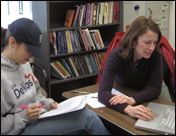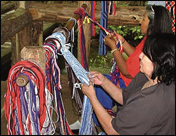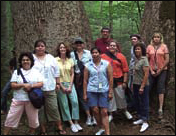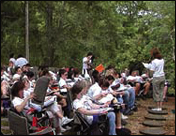Collaborating with the Cherokee Nation
- Ellen Cushman
- Associate Professor, Writing, Rhetoric, and American Cultures
- College of Arts and Letters

Ellen Cushman and WRA 417 students prepare for a videoconference with members of the Cherokee Nation to discuss building the Web site.
For Ellen Cushman, research is a matter of accountability. "The Cherokee principle of gadugi (ga-DEW-key)—to 'do for your people'—maps really well onto the land-grant university mission," she explained.
This guiding principle has shaped her research. A citizen of the Cherokee Nation, Dr. Cushman has been collaborating with the Nation for several years. Although she has been involved in activist ethnographies in the past, she notes that, by working with the Cherokee Nation, she is negotiating through the identity politics of being a Native scholar.

Demonstration of traditional finger weaving for Youth Leadership Institute participants by representatives of the Eastern Band of Cherokee Indians, Oconaluftee Village, North Carolina.
As a Cherokee "outlander," a citizen born and raised apart from the cultural core in Tahlequah, Oklahoma, Cushman found that by focusing her research on the needs of the Cherokees she was able to enact a kind of accountability to the Nation that would otherwise be inaccessible to her given her geographical constraints. Through this partnership, "Ellen the Scholar vs. Ellen the Cherokee" have been united; these two separate parts of herself have become, in her words, "mutually sustaining as opposed to antagonistic."
Cushman's research is on Cherokee use of technology as a means of cultural survival. This encompasses both material technologies (such as the historical uses of the atlatl, a tool used for improving the throwing distance of spears) and discursive practices (including the crafting of laws and modern technologies for language instruction and preservation). Her work also focuses on developing educational resources. In particular, she creates "knowledge products in collaboration with the Nation to further their goals."

Ellen Cushman (third from left) with Cherokee language and music instructors and administrators in the Joyce Kilmer Memorial Forest, NC.
These products have taken several forms. Perhaps the largest collaboration to date was a three-year service-learning project by undergraduate and graduate students enrolled in WRA 417: Multimedia Writing. The students conducted research and created three interactive Web sites focusing on various eras of Cherokee history using video, audio, and interactive technologies (available on the Cherokee Nation Web site, cherokee.org).

History lesson in front of the Chieftains Museum, with YLI students.
Although Cushman no longer teaches WRA 417, her collaboration continues. She has traveled several times to the Cherokee Nation headquarters in Tahlequah and worked directly with its programs, such as the Cherokee Nation Summer Youth Leadership Institute (YLI). She has also been asked to speak during the Cherokee National Holiday, where she was introduced by former Cherokee Chief Wilma Mankiller, and in May 2008, Chief Chad Smith appointed her to the Sequoyah Commission, which supports scholarly research relevant to Cherokee cultural preservation.
Cushman believes these experiences have made her research and outreach stronger. She has also learned that if she wishes to integrate a service-learning component into her teaching, she must both adapt the nature of her work for a different course and evaluate the needs of the community. This academic model and her partnership with the Cherokee Nation have led to what Cushman called "an emergent sense of outreach." Her research is no longer about what is produced, but how. "It keeps outreach initiatives fresh and innovative," she said.
- Written by Lisa Eldrid, University Outreach and Engagement